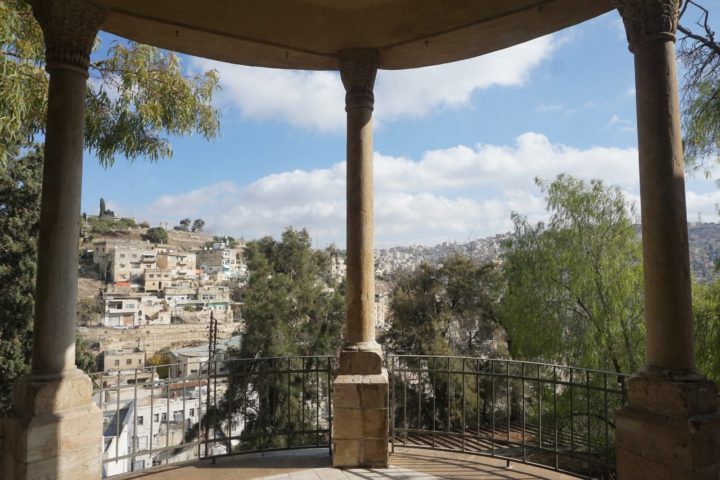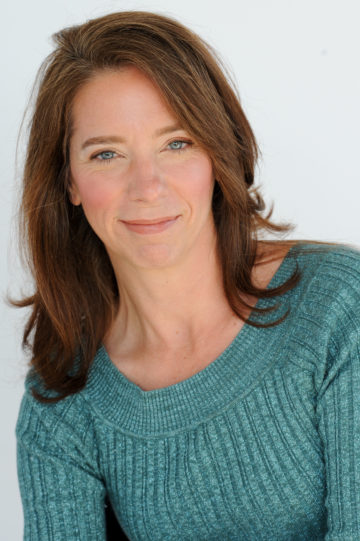
Instructor Aimee Samara Krouskop, an alum of the “Sustainability at the Margins” faculty development seminar (jointly coordinated by ACOR and CAORC in January 2020), discusses an in-person study-abroad program she has developed and is offering for students through Portland Community College in the coming academic year: Peace and Conflict in Jordan: Peace-building and Conflict Transformation through a Humanitarian Lens.
While working in the international humanitarian arena, I organized tours and delegations for supporters, often quite seasoned travelers with a breadth of cross-cultural experience. As a result of the participants’ worldliness, these programs were rich with meaning and initiative for social change. However, I have since realized the unique joys and momentum gained from launching study-abroad programs for community-college students who have never traveled beyond North America.
In 2020, while attending the “Sustainability at the Margins” ACOR-CAORC Faculty Development Seminar in Jordan, I became heart-set on developing such a study-abroad program anchored by my experience during the seminar. Here I will share my process and inspiration, and, as travel re-emerges in this vaccine era of COVID-19, I’m delighted to be moving forward with a fall course offering called “Peace and Conflict in Jordan: Peace-building and Conflict Transformation through a Humanitarian Lens.”

I teach sociology at the community-college level, primarily with an applied and cultural-diversity lens. My students are eager to explore real solutions to current, complex problems. I rely on case studies from my international work addressing issues across multiple sectors, and my students readily take a fresh—and sometimes critical—view of U.S. society from a cultural-comparison perspective. I am regularly inspired by their ability to surmount life challenges to accomplish their coursework. Completing their associate degrees and readying themselves for transfer to a focused degree program of their choice often occurs alongside juggling multiple jobs and financial instability, health-care insecurity, and eldercare or childcare challenges. As a result, most have not yet had the opportunity to explore the world and see the solutions we discuss firsthand. Explorative travel is rarely an option for my students, financially or logistically.
Imagine the power of such a learner—perhaps the first in their family to attend college—stepping into a passport office to become ready to leave the United States for the first time. Further, imagine the world made more reachable to them through key interactions abroad: intellectual epiphanies, physical and sensory contact, opportunities for adventitious and intimate exchange of perspectives, connections made between their own lives and that of broader human existence.
I led my first study-abroad program, Introduction to Sociology, to Bolivia in 2018. Through it, I witnessed participants’ intense sense of discovery and became “hooked” on assisting students of the community-college sector to gain more world access. Then, while in Jordan, I chose to work out a way to bring my introductory Peace and Conflict course to the country. The course explores peace and conflict at three levels: interpersonal, nation-state, and intergroup. With such a sweeping take on the content, I was posed with a challenge: to develop an academically sound experience for a program in Jordan that addresses the three levels of peace and conflict analysis and also offers authentic, meaningful interactions with local residents.
Before the seminar’s end, I arranged a consultation with a staff member from the Jordan field office of the School for International Training (SIT), a study-abroad provider. Once home, I drafted a curriculum and then began to work with Portland Community College and SIT to develop plans to implement the course. The program features a focus on USAID’s Sustainable Cultural Heritage Through Engagement of Local Communities Project (SCHEP), implemented by ACOR, and our “campus” in Amman will be the ACOR hostel. I am already grateful for the support that SCHEP and other ACOR staff have provided in these early stages of program development.
Peace and Conflict in Jordan: Peace-building and Conflict Transformation through a Humanitarian Lens will be delivered as a split program. The first five weeks will be delivered online during the end of the fall 2021 term. During this initial segment, students will explore worldviews, tools, and perspectives for understanding conflict and will apply these concepts through the three aforementioned levels of analysis (interpersonal, nation-state, intergroup). By week five, we will shift focus to foundational requirements for peacebuilding and the application of conflict transformation strategies that hinge on the acknowledgement and protection of human needs and human rights. Then, we will begin a solutions-oriented track and explore initiatives and ideologies that support these foundational requirements. We will address global peace institutions and state interventions with a human rights perspective, truth and reconciliation projects, healthy civil society initiatives, ideologies and practices such as multiculturalism and democratic pluralism, and interpersonal strategies, such as nonviolent communication and the techniques of the Compassionate Listening Project.
With those building blocks in place from the first five weeks online, completing the course in person in Jordan will expose students to a unique set of case studies and practices relevant to these foundational aspects of peacekeeping and conflict resolution. We will also continue our focus on the three levels of analysis introduced online. These are:
Interpersonal
My inspiration for a program viewing Jordan through an interpersonal lens first began to fall into place during a lecture offered by Dr. ‘Alladein Adawi (associate professor of Islamic studies and hadith at the University of Jordan) during the ACOR-CAORC Faculty Development Seminar in January 2020. His presentation on “Sustainability from an Islamic Perspective” provided insight into how Islamic tenets such as trustworthiness, cooperation, humility, virtuous deeds, and hospitality, all of which are woven into dominant Jordanian culture, play a significant role in creating a relatively peaceful and inclusive society, especially in this ethnically and religiously diverse country.
During the pre-departure phase of this course, students will receive survival Arabic lessons that incorporate phrases and other communications that express these Islamic tenets supportive of the health of Jordan’s society. My hope is that students will be able to better identify, “hear,” and engage with these expressions and lived principles while interacting with locals during their time in Jordan.
Nation-State
Speakers will provide an introduction to historical and current state conflicts and peace initiatives in the Middle East and North Africa (MENA) region. Through lectures by local scholars, insights received from United Nations staff, and visits to NGOs that run initiatives such as refugee support projects, students will have a chance to learn the role that policy and organizations in Jordan play in supporting peace and reconciliation in the region. They will also learn how challenges to sustainability (such as water scarcity) and the opportunities those challenges present intersect with social and economic realities locally and in region.
Inter-group
Through field visits to places across Jordan, we will explore the intergroup level through a project I was introduced to during the faculty seminar: the Sustainable Cultural Heritage Through Engagement of Local Communities Project (SCHEP, funded by USAID and implemented by ACOR). SCHEP’s “community-first approach” to sustainable tourism is designed to preserve, manage, and promote cultural heritage resources while providing education, employment, and economic development to communities with high poverty and unemployment rates, often in populations that also have a large refugee presence. SCHEP activities offer technical training and micro-enterprise support to local communities so they can take part in the management and hosting of UNESCO heritage sites and take advantage of the momentum of Jordan’s tourism sector.
In addition to learning about the participatory engagement methods implemented by SCHEP, students will directly experience the community-led, cultural, natural, and gastronomic heritage tourism projects offered by partnering docents. We will visit the Community-Based Rock Art and Epigraphic Recording Project (CBRAER) at Wadi Rum, the Umm el-Jimal Archaeological Project (UJAP), and the Madaba Regional Archaeological Museum Project (MRAMP). Supplementing these projects, we’ll also visit the USAID-funded Nabatean Life Project in Petra.
Each of these projects exists within the broader landscape of Jordan’s stressed economic and resource infrastructure, exacerbated by Jordan’s significant humanitarian commitment to refugees. This will give us a chance to examine how the SCHEP model—which provides income, security, and avenues of cultural expression for people living in Jordan’s “poverty pockets” and experiencing these local pressures—might support intergroup well-being. As HRH Prince Feisal Al Hussein, contributor, founder, and chairman of Generations For Peace, writes,
Displacement itself can lead to further conflicts as communities’ populations change, grow, and adapt to the new realities of their demographics. Conflicts are natural and unavoidable, as we human beings are naturally diverse, but we must support and embrace diversity, see it as a strength, and practice active tolerance to ensure these natural conflicts can be peacefully resolved.[1]
In all, I see Jordan as a peace and conflict-resolution laboratory for this introductory course. My intent for our time in country is that students will become enabled to observe conflict as the natural and unavoidable phenomenon that Prince Feisal Al Hussein describes; interact with a lens that acknowledges connections between peace, conflict, diversity, and cultural expression; and gain first-hand understanding of how government and international support, alongside the initiative of local and refugee communities, can create well-considered projects that provide the foundations necessary for peace.
Visit the Portland Community College website to learn more about Aimee’s course, Peace and Conflict in Jordan: Peace-building and Conflict Transformation through a Humanitarian Lens.
To learn more about the faculty development seminar program, please see our recap article from spring 2020. For articles written by other seminar participants, see the FDS tag on Insights.
- HRH Prince Feisal Al Hussein, “Tolerance Is Not Enough: Why ‘Active’ Tolerance Is Needed Now More Than Ever,” HuffPost, 16 November 2016.






